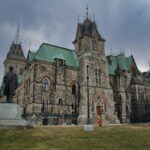Table of Contents
- A Monumental Shift: The End of the First-Generation Limit on Citizenship
- Understanding the First-Generation Limit (FGL) and Its Profound Impact
- The Legislative Path Forward: What Happens After the House Vote?
- Key Takeaways: How the New Canadian Citizenship by Descent Rules Will Work
- Frequently Asked Questions
In a landmark legislative development, Canada’s House of Commons has decisively voted to pass a bill aimed at removing the controversial first-generation limit (FGL) on citizenship by descent. This momentous decision signals a potential end to a policy that has, for over a decade, prevented many Canadians born abroad from passing on their citizenship to their own children born outside of Canada. The vote represents a significant victory for countless families and advocacy groups who have long argued that the FGL created a class of “Lost Canadians,” unfairly severing familial and national ties to Canada. As the bill now moves to the Senate for further consideration, this article explores the profound implications of this change, the history of the FGL, and what this legislative shift means for the future of Canadian citizenship.
A Monumental Shift: The End of the First-Generation Limit on Citizenship
The recent vote in the House of Commons marks a pivotal turning point in Canadian citizenship law. The proposed legislation, which garnered widespread support, directly addresses the restrictive first-generation limit implemented in 2009. Prior to these changes, the rules surrounding citizenship by descent were more permissive. However, the 2009 amendments to the Citizenship Act sought to prevent citizenship from being passed down indefinitely through generations of Canadians living abroad with little to no connection to the country. While the intention was to strengthen the value of Canadian citizenship, the execution of the FGL had severe and often heartbreaking unintended consequences. It effectively created a two-tier system of citizenship, where Canadians born in Canada could pass on their citizenship to their children born abroad, but Canadians who were themselves born abroad and derived their citizenship from a Canadian parent could not. This restriction applied regardless of the parent’s deep connection to Canada, including years of residency, paying taxes, or service to the country. This latest legislative action is the culmination of years of advocacy and legal challenges, most notably an Ontario Superior Court of Justice ruling that found the FGL to be unconstitutional, violating sections of the Canadian Charter of Rights and Freedoms.
Understanding the First-Generation Limit (FGL) and Its Profound Impact
The first-generation limit, often referred to as the FGL rule, is a provision within the Citizenship Act that restricts the automatic acquisition of Canadian citizenship by descent to the first generation born outside of Canada. In simple terms, if a Canadian citizen parent was also born outside Canada and acquired their citizenship through their own Canadian parent (i.e., they are the first generation born abroad), they cannot automatically pass that citizenship on to their child if that child is also born outside Canada. This rule has had a far-reaching and deeply personal impact on thousands of families. For instance, consider a Canadian who was born in the United States to a Canadian diplomat. That individual is a Canadian citizen by descent. However, if they grow up, pursue an international career, and have a child in Germany, that child would not automatically be a Canadian citizen under the FGL rule. This has created immense practical and emotional challenges, forcing families to make difficult decisions about where to live and raise their children, or severing a child’s legal connection to their Canadian heritage. The rule did not account for individuals who, despite being born abroad, spent their formative years in Canada, attended Canadian schools, and identified strongly as Canadian. The vote to remove this limit acknowledges the inherent unfairness of this blanket policy and seeks to replace it with a more nuanced approach.
The Legislative Path Forward: What Happens After the House Vote?
While the successful vote in the House of Commons is a critical and celebratory milestone, it is not the final step in the legislative process. For the proposed changes to become law, the bill must now proceed to the Senate of Canada. In the Senate, the bill will undergo a similar process of debate and review, including first, second, and third readings. Senators will scrutinize the legislation, and it may be referred to a committee for more detailed study, where experts and stakeholders can provide testimony. If the Senate passes the bill without any amendments, it can then proceed to the final stage: Royal Assent, where it is signed into law by the Governor General. If the Senate proposes amendments, the bill must be returned to the House of Commons for those amendments to be considered and approved. The government has indicated a strong desire to see these changes enacted swiftly, suggesting the process may be expedited. The proposed replacement for the FGL is expected to be a “substantial connection” test. This new test would allow a Canadian parent born abroad to pass on citizenship to their child born abroad if they can demonstrate a significant physical presence in Canada prior to the child’s birth—typically a cumulative period of at least three years (1,095 days). This approach aims to ensure that citizenship is passed on by those who have a genuine and meaningful tie to the country, striking a balance between inclusivity and maintaining the integrity of Canadian citizenship.
Key Takeaways: How the New Canadian Citizenship by Descent Rules Will Work
The proposed amendments to the Citizenship Act introduce significant changes that will affect thousands of families worldwide. Understanding these key points is crucial for anyone impacted by the first-generation limit. Here is a summary of the most important takeaways from the new legislation:
- Abolition of the First-Generation Limit: The core of the bill is the complete removal of the current rule that automatically prevents second-generation Canadians born abroad from inheriting citizenship.
- Introduction of the “Substantial Connection” Test: To replace the FGL, a new requirement will be introduced. A Canadian parent born abroad can pass on citizenship if they can prove they have spent a cumulative total of at least 1,095 days (three years) physically present in Canada before the birth or adoption of their child.
- Restoration of Citizenship for “Lost Canadians”: The legislation is expected to have retroactive provisions to restore citizenship to individuals who were previously denied it or were unaware they could not pass it down due to the FGL. This will be a monumental step in rectifying past injustices.
- Impact on Future Generations: This change ensures that a parent’s connection to Canada, demonstrated through physical presence, is the determining factor, not their place of birth. It provides a clear and attainable pathway for future generations of Canadians abroad to retain their heritage.
- Simplifying Family Unity: For many families living abroad for work or personal reasons, this change removes a significant source of stress and legal complexity, allowing them to remain united under a shared Canadian identity without being forced to relocate for childbirth.
Frequently Asked Questions
What is the first-generation limit (FGL) on Canadian citizenship?
The first-generation limit is a rule in the Citizenship Act, enacted in 2009, which prevents a Canadian citizen who was also born abroad from automatically passing on their citizenship to their own child if that child is also born outside of Canada. This legislative change seeks to abolish that rule.
How will the new “substantial connection” test work for citizenship by descent?
The proposed new test requires a Canadian parent who was born outside of Canada to have been physically present in Canada for a cumulative total of at least 1,095 days (three years) before the birth of their child. This demonstrated presence in Canada would allow them to pass on citizenship to their child born abroad.
What happens now that the House of Commons has passed the bill?
After passing in the House of Commons, the bill must go through the Senate for approval. If the Senate passes it, the final step is receiving Royal Assent from the Governor General, at which point it officially becomes law.
Will these changes apply to people who were already affected by the FGL in the past?
The legislation is expected to include retroactive measures. This means it should restore citizenship rights to individuals who were previously unable to become citizens or pass on citizenship because of the first-generation limit rule.
Talk to us to find out more. ->
The content above is not intended to provide legal advice or opinions of any kind and may not be used for professional or commercial purposes.







